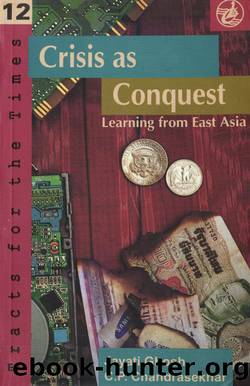Crisis as Conquest: Learning from East Asia (TRACTS FOR THE TIMES 12) by Jayati Ghosh

Author:Jayati Ghosh [Jayati Ghosh]
Language: eng
Format: epub
7
The Significance of East Asian Industrialisation
Until the financial crisis of 1997, the dynamic economic expansion of some East Asian countries dominated discussions on post-war development. This was justified by the continuous post-war growth in Japan until the mid-1980s, the experience of the first 'miracle' economies of South Korea, Taiwan, Hong Kong and Singapore, and the subsequent spread of that growth to some 'second-tier newly industrialising countries' such as Thailand, Indonesia and Malaysia, along with China.
One reason why there was so much interest in this region was the evidence of a significant shift (which has been noted earlier) in the distribution of value added in manufacturing between developed and developing countries. The East Asian region alone accounted for the major part of this shift. This in turn led to a questioning of the 'orthodox' left perception that the possibilities for industrialisation in developing countries were constrained by the nature of capitalist development on a world scale, since it involved the domination and subordination of less developed countries by metropolitan capital.
Of course, that perception itself should not be read ahistorically. No one would, for example, equate the hegemonic relationship between imperialism and the underdeveloped countries during the colonial era, when political subordination and plunder condemned many colonies to economic stagnation, with that which prevailed in the post-decolonisation, cold war era of neocolonial interaction. In the earlier period, external political control completely determined the nature and impact of capitalist penetration. In the latter, more material forms of subordination (control over technology, ownership through investment, etc.) by international capital were supported with political pressure on relatively autonomous domestic states, either directly by metropolitan governments or indirectly by international financial institutions. The constraints on decision-making by the domestic state, which were set by internal structures and class configurations, combined with external subordination to determine the outcome of the economic interaction between the developed and underdeveloped countries. The orthodox perception essentially was that the distorting effects of colonialism on relations of production within the underdeveloped countries, along with the inability of the postcolonial states to undertake any process of radical transformation of such relations, limited the expansion of the domestic market and thereby sapped the potential for industrialisation and capitalist transformation in these countries.
This correlation of forces was seen to constrain industrialisation and capitalist development in at least three ways. First, it prevented any radical transformation of agrarian relations, and thereby constrained both the domestic market and the manoeuvrability of the state. Second, it converted the underdeveloped countries into sources of surplus used to finance the process of capital accumulation that remained primarily concentrated in developed countries. Third, as a consequence, it subordinated local production and markets to the needs of capital accumulation on a world scale, resulting in growing external vulnerability. The argument was not that capitalist development would not occur at all, but that such development would be characterised by extreme gradualism and unevenness, its effects on wage earners and direct small producers would be damaging and that at all times it would be
Download
This site does not store any files on its server. We only index and link to content provided by other sites. Please contact the content providers to delete copyright contents if any and email us, we'll remove relevant links or contents immediately.
International Integration of the Brazilian Economy by Elias C. Grivoyannis(110027)
The Radium Girls by Kate Moore(12018)
Turbulence by E. J. Noyes(8040)
Nudge - Improving Decisions about Health, Wealth, and Happiness by Thaler Sunstein(7692)
The Black Swan by Nassim Nicholas Taleb(7106)
Rich Dad Poor Dad by Robert T. Kiyosaki(6608)
Pioneering Portfolio Management by David F. Swensen(6288)
Man-made Catastrophes and Risk Information Concealment by Dmitry Chernov & Didier Sornette(6005)
Zero to One by Peter Thiel(5786)
Secrecy World by Jake Bernstein(4741)
Millionaire: The Philanderer, Gambler, and Duelist Who Invented Modern Finance by Janet Gleeson(4465)
The Age of Surveillance Capitalism by Shoshana Zuboff(4275)
Skin in the Game by Nassim Nicholas Taleb(4237)
The Money Culture by Michael Lewis(4198)
Bullshit Jobs by David Graeber(4179)
Skin in the Game: Hidden Asymmetries in Daily Life by Nassim Nicholas Taleb(3989)
The Dhandho Investor by Mohnish Pabrai(3758)
The Wisdom of Finance by Mihir Desai(3733)
Blockchain Basics by Daniel Drescher(3574)
